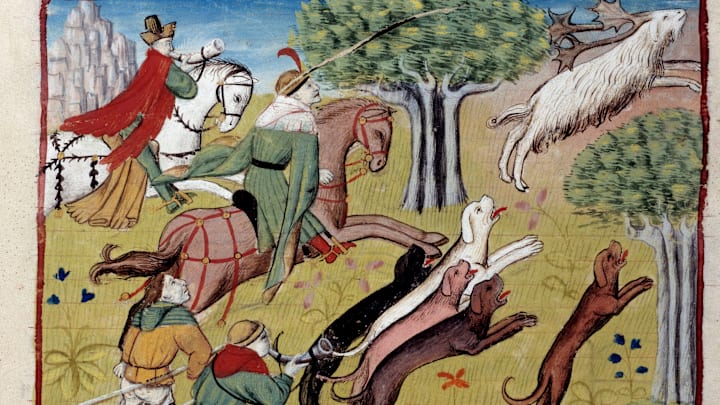You might think of your dog as the best dog of all. One medieval dog owner actually called theirs that. No, literally—the dog’s name was Beste-of-all.
Per Open Culture, the moniker comes from a 15th-century manuscript containing a list of more than 1000 names of hounds (specifically hunting dogs). David Scott-Macnab, an English literature professor at South Africa’s North-West University, published all the names in a 2013 article for the journal Viator.
There are a surprising number of parallels between today’s most popular dog names and this centuries-old selection. We have Bella; they had Belle. They had Compaynowne (companion) and Felowe, which maps onto our Buddy. We have Bear; they had Foxe and Mouse (and, OK, Salmon). Our Daisy isn’t so different from their Flowre.
That said, you’d be hard-pressed to find a dog these days named Brainless (or, Brayneles, as it was spelled). Medieval people habitually christened their dogs with words that described them. Some were complimentary, sure—Amyable, Harmeles, Trusty, Joliboye, Pretyman—but plenty others were hilariously harsh: Helpeles, Filthe, Litillwitte, Synfull, and plain old Badde.
There’s further evidence that these bygone pet owners had a sense of humor about their charges: Somewhere out there were canines named Lewde, Lusty, Ribawde, and Nameles. Not to mention Spowse (spouse) and Hosewife (housewife).
One especially prevalent trend, unsurprisingly, is names related to hunting—including Bryngehome, Fyndewell, Goodynowze, Kilbucke, and Makehitgood. But it’s the random ones that are most fun, from Argument and Bryan to Feete and Garlik.
You can explore our 100 favorite names from the manuscript below. (And if you’re hoping to pick one out for your next pet, Tom Killeen built a name generator that features all 1065 of them.)
- Achilles
- Amyable
- Argument
- Baby
- Badde
- Barefote
- Belle
- Beste-of-all
- Birdismowthe
- Blameles
- Bonere
- Brayneles
- Bryan
- Bryngehome
- Careles
- Champyn
- Charlemayne
- Chawnseler
- Christabell
- Compaynowne
- Cowntirfette
- Cruell
- Cunnynge
- Dawngere
- Dolfyn
- Dragon
- Dredefull
- Duchesse
- Dyamound
- Ercules
- Ergo
- Farewell
- Feete
- Felowe
- Filthe
- Flame
- Flowre
- Foxe
- Fyndewell
- Garlik
- Gaweyne
- Go-bifore
- Go-byhynde
- Goodynowze
- Happy
- Harlet
- Harmeles
- Havegoodday
- Helpeles
- Holdefaste
- Holy
- Honydewe
- Hosewife
- Joliboye
- Kilbucke
- Kynysman
- Letego
- Lewde
- Liberall
- Litilboye
- Litillwitte
- Litilman
- Lusty
- Makehitgood
- Monke
- Mouse
- Musike
- Mustarde
- Mynstrell
- Nameles
- Nero
- Noforse
- Nosewise
- Oribull
- Pretiboy
- Pretyman
- Quycke
- Radissche
- Rage
- Ribawde
- Rumbilowe
- Salmon
- Scathelok
- Schakbagge
- Spowse
- Swepestake
- Symple
- Synfull
- Thought
- Trusty
- Tullymully
- Vengeabull
- Vyolette
- Wantone
- Welcome
- Wellyfedde
- Wenche
- Whiteberde
- Wrecche
- Wyseman
